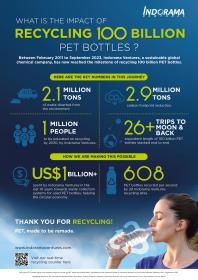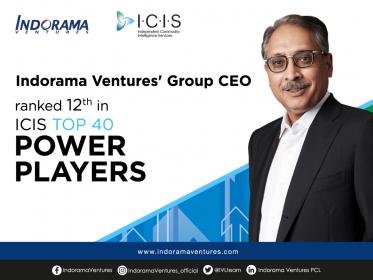Indorama Ventures recycles 100 billion PET bottles
Indorama Ventures Public Company Limited, a global sustainable chemical company, announced that it has recycled 100 billion post-consumer PET bottles since February 2011. This has diverted 2.1 million tons of waste from the environment and saved 2.9 million tons of carbon footprint from the product lifecycles. Demonstrating its commitment to support the establishment of a circular economy for PET, in the last ten years Indorama Ventures has spent more than $1 billion towards waste collection of used PET bottles.
The company has also committed a further $1.5 billion to expand its recycling business. To support increased recycling rates globally, Indorama Ventures has expanded its recycling facilities, infrastructure, and public education programs. The unique PET plastic used in soft drinks and water bottles is fully recyclable and is collected in practice and at scale. As a result, PET is the most recycled plastic in the world, and the company’s recycling achievements support that. Building on its position as the world’s largest producer of recycled resin used in plastic beverage bottles, Indorama Ventures is also seeking advanced technologies to deliver more recycling infrastructure globally and reduce lifecycle carbon emissions.
The company now has 20 recycling sites in Asia, the Americas, and Europe. Recent developments include doubling the capacity of a recycling site in Brazil; and the opening of PETValue, the largest bottle-to-bottle recycling facility in the Philippines, in partnership with Coca-Cola. Both part of a $300 million ‘Blue Loan’ Indorama Ventures received in 2020 from the International Finance Corporation (IFC), part of the World Bank, and Asian Development Bank. The loan has the objective of increasing recycling capacity and diverting plastic waste from landfills and oceans in Thailand, Indonesia, Philippines, India, and Brazil - countries seeking support in managing environmental waste. Indorama Ventures has also partnered with the Yunus Foundation, a leading non-profit organization promoting sustainable development with a global network, with the goal of educating one million consumers globally about recycling by 2030 with 200,000 reached so far.
Indorama



















